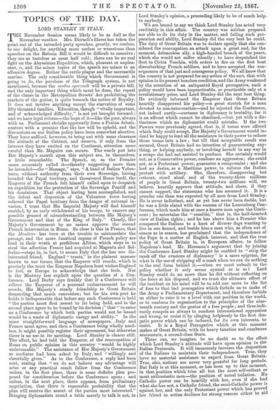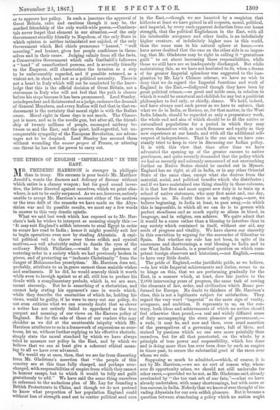TOPICS OF THE DAY.
LORD STANLEY IN ITALY.
THE November Session seems likely to be as dull as the November weather. Mrs. Disraeli's illness has taken the point out of the intended party speeches, greatly, we confess, to our delight, for anything more useless or wearsiome than speeches on the Reform Bill it would be difficult to conceive ; they are as tasteless as meat half cold ; there can be no real fight on the Abyssinian Expedition, which, pleasant or unplea- sant, is, and the minor topics of the speech are minor to an offensive degree. Bother the cattle plague and the mercantile marine. The only considerable thing which Government is going to do, the purchase of the Telegraph system, is not mentioned, because the modus operandi will be a private bill, and the only important thing which must be done, the repeal of the clause in the Metropolitan Streets' Act prohibiting the markets of the gutter, is quite beneath the notice, of Royalty. It does not involve anything except the starvation of some fifty thousand families. Education, though "vitally important, and of acknowledged difficulty," is not yet brought forward ; and we have legal reform—the hope of it—like the poor, always with us. Parliament shrinks apparently from a Fenian debate, content with a promise that the law will be upheld, and the discussions on our Italian policy have been somewhat abortive. They have sufficed, however, to bring out with some clearness the attitude of the Cabinet, and deserve, if only from the interest they have excited on the Continent, attention more careful than Mr. Maguire can secure. The words put into Her Majesty's mouth upon this subject are, in themselves, a little remarkable. The Speech, or, as the Premier more accurately called it—thereby suggesting more than he intended—the "Message," says, "A band of Italian Volun- teers, without authority from their own Sovereign, having invaded the Papal territory, and threatened Rome itself, the Emperor of the French felt himself called upon to despatch an expedition for the protection of the Sovereign Pontiff and his dominions. That object having been accomplished, and the defeat and dispersion of the Volunteer force having relieved the Papal territory from the danger of external in- vasion, I trust that His Imperial Majesty will find himself enabled, by an early withdrawal of his troops, to remove any possible ground of misunderstanding between His Majesty's Government and that of the Bing of Italy." Clearly, Her Majesty's Government by no means approve the second French intervention in Rome. So clear is this in France, that the Moniteur has been at the trouble to mistranslate the passage, and the more fanatical organs of French policy are loud in their wrath at perfidious Albion, which steps in to steal the affection France had acquired at Magenta and Sol- ferino—steps in, in fact, to assure Italy that she has one dis- interested friend. England "trusts," in the plainest manner known to our forms, that the Emperor will recede, which is precisely the trust the Emperor Napoleon least wishes England to feel, or Europe to acknowledge that she feels. Nor is the Ministry less explicit upon the question of a Con- ference. Lord Derby says frankly that if a Conference will relieve the Emperor of a personal embarrassment he will accede, His Majesty's steady friendship to Great Britain demanding that much concession; but for his own part he holds it indispensable that before any such Conference is held "the parties must first assent to its being held, and in the second place agree to be bound by its decision ;" that " to enter on a Conference by which both parties would not be bound would be a waste of diplomatic energy and ability." In the more straightforward language of newspapers, „Italy and France must agree, and then a Conference being wholly need- less, it might possibly register their agreement, but otherwise there is no use in its meeting. Lord Stanley is clearer still. The effect, he had told the Emperor, of the reoccupation of Rome on public opinion in this country. "would be highly unfavourable." The assistance of Her Majesty's Government as mediator had been asked by Italy, and "willingly and cheerfully given." As to the Conference, a reply had been sent, stating that "we do not believe any advantage will arise or any practical result follow from the Conference unless, in the first place, there is some definite plan pro- posed for consideration before the Conference opens ; and unless, in the next place, there appears, from preliminary negotiation, that there is reesonable probability that the plan will receive the assent of the parties most interested." Bringing diplomatists round a table merely to talk is not, in her friend in action declines for strong reasons either to aid Lord Stanley's opinion, a proceeding likely to be of much help to anybody.
We are bound to say we think Lord Stanley has acted very creditably in this affair. The country was neither prepared nor able to do its duty in the matter, and failing such pre- paration and ability, Lord Stanley did the very best he could. The duty of Great Britain was to declare openly that she con- sidered the reoccupation an attack upon a great and, for the moment, defenceless ally, a high-handed breach of the peace,. which she would not suffer silently ; to have despatched the fleet to Civita Vecchia, with orders to fire on the first boat disembarking French soldiers, and to have accepted the con- sequences of that just and courageous policy. We all know that the country is not prepared for any action of the sort, that with opinion in its present boneless condition, and the Army weakened' by the retention of an antiquated Royal prerogative, such a policy would have been impracticable, or practicable only at a revolutionary price, and Lord Stanley did the next best thing. He evidently informed the Emperor that Great Britain heartily disapproved his policy—a great stretch for a man devoted to non-intervention—and he rejected the Conference,. not indeed curtly—curtness in diplomacy is brutality, for it is an affront which cannot be chastised,—but yet with a dis- tinctness which no diplomatist could mistake. If the two Powers were previously agreed, that is, if terms were offered which Italy could accept, Her Majesty's Government would in- deed be happy to lend all the assistance in their power to reduce those terms into a law • but till that acceptable result was. secured, Great Britain had no intention of guaranteeing any- thing, or helping anybody, or involving herself in any way in a scrape she had not assisted to produce. She certainly would not, as a Conservative power, condone an aggression; she could not, as a Protestant power, guarantee a compromise ; and she- had no desire, as a Maritime power, to enforce the Italian protest with artillery. She, therefore, disapproving but reticent, stood aloof, and of the twenty-three millions of people in Great Britain, twenty-two millions will, we believe, heartily approve that attitude,. and cheer, if they cannot support, the statesman who has assumed it. It is a prouder one than was expected by all men from Lord Stanley. He is never indistinct, and as yet has never been feeble, but he was a little elated with the success of the Luxemburg Con- ference, which made him at once a known man upon the Conti- nent; he entertains the "sensible," that is, the half-hearted view of Italian rights ; and he has above him a Premier who compared the Italians to a knot of diverse dogs wanting to live in one kennel, and beside him a man who, as often out of season as in season, has proclaimed that the independence of the Pope is a matter of English interest, and that the true policy of Great Britain is, in European affairs, to follow Napoleon's lead. Mr. Horsman's argument that by joining the Conference Lord Stanley might be enabled to "strip the mask off the evasions of diplomacy" is a mere epigram, for what is the use of stripping off a mask when we can do nothing to the real form behind it,—when we must submit to the policy whether it only seems cynical or is so ? Lord Stanley could do no more than he did without reflecting on the force at his disposal, and we trust the ultimate effect of the incident on his mind will be to add one more to the list of foes to that bad prerogative which forbids us to make of the Army a Parliamentary Department, and therefore forbids us either to raise it to a level with our position in the world, or to conform its organization to the principles of the nine- teenth century and the genius of a free people ; and thus indi- rectly compels us always to condone international oppression and wrong, or resist it by clinging helplessly to the first des- potic power which can be induced, for its own interests, to resist. It is a Royal Prerogative which at this moment makes of Great Britain, with its heavy taxation and cumbrous armaments, a second-class State.
There can, we imagine, be no doubt as to the effect which Lord Stanley's attitude will have upon opinion in the Italian Peninsula. It will immensely increase the disposition of the Italians to maintain their independence. True, they have no material assistance to expect from Great Britain. True, also, nations are never very grateful for long periods. But Italy is at this moment, or has been up to this moment, in that position which tries all but the most self-reliant or most enthusiastic men—the position of moral isolation. No Catholic power can be heartily with her, even if she had what she has not, a Catholic friend, the semi-Catholic power is auainst her, and the only Protestant power which has proved or to approve her policy. In such a juncture the approval of Great Britain, calm and cautious though it may be, the marked friendship of the only world-wide power,—Continen- tals never forget that element in our situation,—of the only Government steadily friendly to Napoleon, of the only State in which opinion is neither intimidated nor cajoled, of the only Government which Red chiefs pronounce "honest," "well meaning," and lenient, gives her people confidence in them- selves and in their cause. Judging calmly from all the facts, a Conservative Government which calls Gaiibaldi's followers " band " of unauthorized persons, and is avowedly friendly to the Emperor, still characterizes the invasion as a step to be unfavourably regarded, and if possible retraced, as a -violent act, in short, and not as a political necessity. There is not a heart in Italy which will not be comforted by the know- ledge that this is the official decision of Great Britain, not a statesman in Italy who will not feel that the path is clearer before his steps because it has been pronounced. Lord Stanley, as independent and disinterested as a judge, endorses the demand of General Menabrea, and every Italian will feel that in that en- dorsement is the certainty that moral right is with the Italian cause. Moral right in these days is not much. The Chasse- pot is more, and so is the needle gun, but after all, the friend- ship of twenty millions of people, encamped midway be- tween us and the East, and the quiet, half-regretful, but un- conquerable sympathy of the European Revolution, are advan- tages not to be despised. Lord Stanley has secured them without wounding the amour propre of France, or uttering one threat he has not the power to carry out.



































 Previous page
Previous page